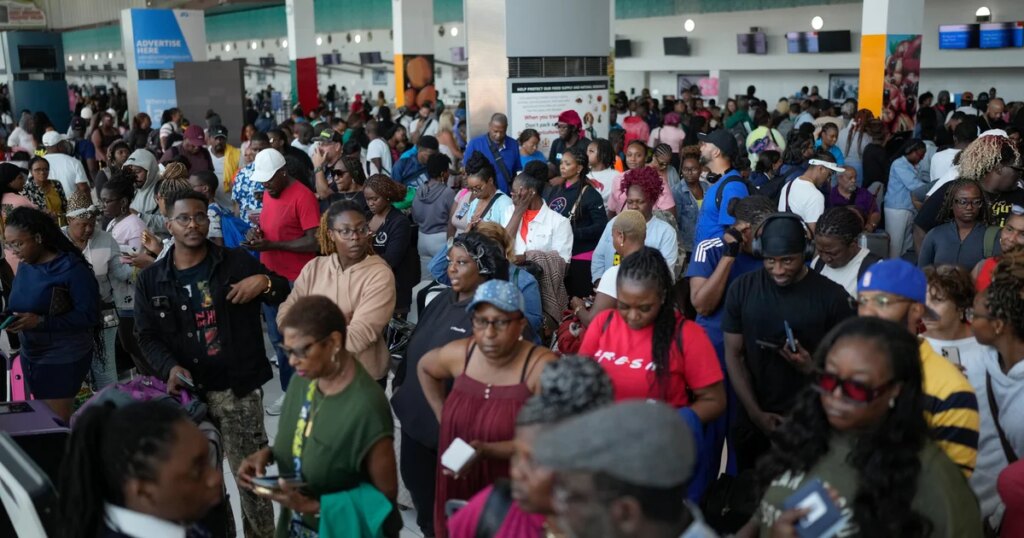In the aftermath of Hurricane Melissa, Jamaica faces devastating challenges as officials report at least 32 confirmed deaths and potentially more. The powerful Category 5 storm struck on October 28, 2025, causing extensive damage primarily in the western region of the island. With the tourism season approaching in December, recovery efforts are underway as authorities scramble to repair infrastructure and revitalized the key tourism sector, which significantly contributes to the national economy.
| Article Subheadings |
|---|
| 1) The Impact of Hurricane Melissa |
| 2) Assessment of Damage and Recovery Efforts |
| 3) The Tourism Sector’s Significance |
| 4) Voices from the Affected Community |
| 5) Long-term Economic Implications |
The Impact of Hurricane Melissa
Hurricane Melissa, which struck Jamaica on October 28, 2025, is reported as one of the most destructive storms in the nation’s recorded history. The powerful hurricane made landfall near New Hope, located on the southwestern coast, with winds reaching extreme speeds. In its wake, officials have confirmed at least 32 fatalities and have warned that additional deaths may be reported as search and recovery operations continue. The intense rainfall and winds contributed to landslides and flooding, exacerbating the damage in several communities, primarily in the western region.
Assessment of Damage and Recovery Efforts
The Jamaican government and various agencies are actively evaluating the hurricane’s damage. According to Christopher Jarrett, who heads the Jamaica Hotel and Tourist Association, the most significant impacts have been reported in the northwest and southwest regions. However, areas like Negril managed to avoid substantial damage, providing a glimmer of hope for the tourism sector. The government has initiated efforts to clear debris and expedite repairs on essential infrastructure, especially hotels, in preparation for the upcoming tourism season.
As part of recovery, all international airports have reopened and resumed commercial flights, a critical step in restoring Jamaica’s connectivity with the outside world. Despite these efforts, communication issues persist in certain areas, notably in the parish of Hanover, hindering further damage assessments. Officials are optimistic but acknowledge the daunting challenges that lie ahead.
The Tourism Sector’s Significance
Tourism stands as Jamaica’s cornerstone industry, directly contributing approximately 30% to the nation’s gross domestic product (GDP) and employing around 175,000 individuals. As the country prepares for the winter tourism season, slated to commence around December 15, the urgency of restoring facilities for potential visitors cannot be overstated. Edmund Bartlett, the Tourism Minister, expressed confidence in the industry’s recovery, although opinions vary on whether all businesses will manage to bounce back by the designated date.
Economists and local business owners acknowledge that the larger hotel chains might recover quicker than smaller establishments, putting them at risk of losing significant tourist revenue during the peak travel period. Nevertheless, many in the industry are optimistic, taking proactive measures to incentivize visitors, including discounts and complimentary stays.
Voices from the Affected Community
The aftermath of Hurricane Melissa has left personal scars in the affected communities. Individuals such as Patricia Mighten, a hotel housekeeper from Hanover, expressed the harsh reality faced by many: “This storm didn’t just destroy buildings; it shattered jobs and incomes for many of us.” The ripple effects are felt not only in loss of employment but also among local vendors struggling to survive due to the absence of tourists. Desrine Smith, a craft vendor in Falmouth, added, “Going days without tourists coming to buy anything means no sales and no money.” As many residents cope with uncertainty, their voices reflect the pressing challenges while highlighting their resilience.
Long-term Economic Implications
The long-term economic implications of Hurricane Melissa remain to be seen. While experts predict that the tourism sector may regain its footing, vulnerable communities will likely experience lingering hardships. The dual impact of employment loss and weakened local economies underscores the broader effects on sectors interconnected with tourism, including agriculture and construction. Given the reliance on tourism as a primary source of foreign exchange, ensuring swift recovery could foster stability across multiple layers of the economy.
| No. | Key Points |
|---|---|
| 1 | Hurricane Melissa caused at least 32 confirmed deaths, with more expected as assessments continue. |
| 2 | Significant damage has been reported in the western region, particularly in southwest Jamaica. |
| 3 | The tourism sector is critical to Jamaica’s economy, contributing around 30% to GDP. |
| 4 | Community voices highlight the impact of the storm on jobs and local livelihoods. |
| 5 | The long-term implications of the storm may affect various interconnected sectors in Jamaica’s economy. |
Summary
Hurricane Melissa has left a tragic legacy in Jamaica, not only through the loss of life but also in the economic disruptions affecting the island’s vital tourism sector. Recovery efforts are crucial as officials work tirelessly to prepare for the upcoming tourist season. The resilience of local communities, while vital, will be tested in the months to follow as they navigate the challenges posed by this catastrophe.
Frequently Asked Questions
Question: What measures is the Jamaican government taking for recovery?
The Jamaican government is actively evaluating damage while initiating repairs on essential infrastructure such as hotels and airports. Efforts include clearing debris and restoring utilities in affected regions.
Question: How does tourism contribute to Jamaica’s economy?
Tourism is Jamaica’s primary source of foreign exchange, contributing approximately 30% to the GDP and providing jobs to around 175,000 people. It also supports other sectors such as agriculture and construction.
Question: What are the community sentiments regarding the hurricane’s impact?
Many residents express distress over job losses and economic insecurities following the storm. Local vendors and hospitality workers report significant challenges in their ability to sustain their livelihoods.
